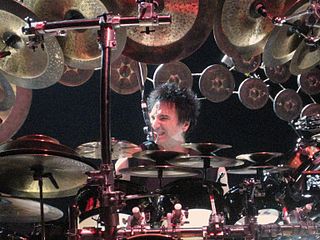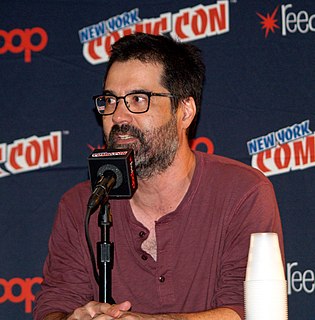A Quote by Robert Rauschenberg
I usually work in a direction until I know how to do it, then I stop. At the time that I am bored or understand - I use those words interchangeably - another appetite has formed. A lot of people try to think up ideas. I'm not one. I'd rather accept the irresistible possibilities of what I can't ignore.
Related Quotes
I really think kids should understand that music is like learning the alphabet. You put small letters together to make words, and then you use these words to create a story, but with music. And they really need to know how to mix and match those letters and how to come up with something that is really interesting, or speak in metaphors as poets do to show us something maybe we didn't think about.
As an educator, I try to get people to be fundamentally curious and to question ideas that they might have or that are shared by others. In that state of mind, they have earned a kind of inoculation against the fuzzy thinking of these weird ideas floating around out there. So rather than correct the weird ideas, I would rather them to know how to think in the first place. Then they can correct the weird idea themselves.
The phrase you usually hear after a cut is "That was great. Perhaps we could have another go. Maybe try it this way." Even that much direction is prefaced with a lot of praise and encouragement. It's quite like how you deal with toddlers: positive reinforcement, and then a little suggestion that you might want to try something different. Roman Polanski will stop the take and shout, "No, no, no!" Which is somewhat alarming the first time it happens.
Don't slag off other creators or companies. We'll cheerfully mock dumb politicians on Twitter, but we try to never slam another creator's work or make fun of another company's projects or initiatives. First, because life's too short. We'd rather use that time to celebrate the fantastic work of colleagues and friends. Second, because it's a small world, and people have long memories. A few snarky words today can ruin a chance for an incredibly rewarding creative partnership tomorrow.
Everyone’s childhood plays itself out. No wonder no one knows the other or can completely understand. By this I don’t know if I’m just giving up with this conclusion or resigning myself — or maybe for the first time connecting with reality. How do we know the pain or another’s earlier years, let alone all that he drags with him since along the way at best a lot of leeway is needed for the other — yet how much is unhealthy for one to bear. I think to love bravely is the best and accept — as much as one can bear.
Often when people are claiming that they are not creative, they mean that they are not artists, writers, athletes, or any other media types demonstrating creativity. Or they know someone who always seems to have a lot of ideas and know that they can't match that. We all have a tendency to idolize those who create what we see in the media. I think it's better to use these people as models rather than idols, especially when these people have aspects of their lives that are similar to us. Then we can take their inspiration as we go on to be creative in our own way in our own lives.
Other people’s words are so important. And then without warning they stop being important, along with all those words of yours that their words prompted you to write. Much of the excitement of a new novel lies in the repudiation of the one written before. Other people’s words are the bridge you use to cross from where you were to wherever you’re going.







































